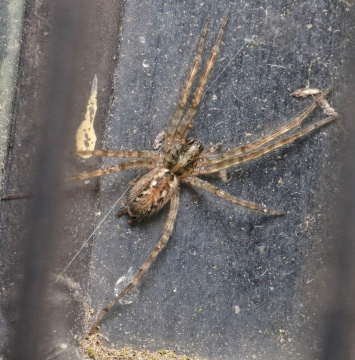Summary for Tegenaria ferruginea (Araneae)
previous species | next species
National Distribution
Terms of Use. Double-click on map to go to region

Explore Regional Distribution
Please log on and add a note on this species
About this species
Recorded altitude range
Species text
DistributionTo date, the only record of this species in Britain is from the village of Elvington, some 9 km south-east of York, Yorkshire, where it was discovered in 1998 (Oxford 1999). Here there is a thriving population centred on the church and churchyard, but with little sign of spreading over time (last surveyed in June 2018). The species was confirmed as still present in 2017 (Oxford, pers. obs). The origin of the Elvington population is unknown, although the local airfield served as a base for French forces during the second world war. The species is widespread in mainland Europe (https://araneae.nmbe.ch/data/404; Oxford & Merrett 2000), although it is commoner in the south (Roberts 1995).
Habitat and ecology
The species frequents holes and crevices in banks and tree trunks, and in barns and derelict buildings (Roberts 1995). In Elvington it has been taken from thick ivy at the base of a hedgerow, a wooden fence, tree crevices and on the outside wall of the church. It does not appear to require a hole or crevice as a retreat; in the church windows it builds a triangular sheet web, similar to that of T. domestica, with a perfectly cylindrical silken retreat. Males are said to mature in summer, whereas mature females can be present all year (Roberts 1995).
Status
Although Elvington is the only known location in Britain, T. ferruginea is superficially similar to our native T. parietina and may in the past have been overlooked as a result of confusion with this species. Distinguishing features of the two are described by Roberts (1995) and Oxford & Merrett (2000). There seems no obvious reason why T. ferruginea should not further colonise this country.
Author of profile: Geoff Oxford.
References
Oxford, G. S. 1999. Tegenaria ferruginea (Panzer, 1804): an agelenid spider new to the British list. Newsl. Br. arachnol. Soc. 84: 10.
Oxford, G. S. & Merrett, P. 2000. Tegenaria ferruginea (Panzer) in Britain, and differences from T. parietina (Fourcroy) (Araneae: Agelenidae). Bull. Br. arachnol. Soc. 11: 331-334.
Roberts, M.J. 1995. Spiders of Britain & Northern Europe. London: HarperCollins.
References
Account last edited by Geoff Oxford at 14:52 on Tue 9th Jan 2024.
Adult Season
Habitats
background methodology
Recorded management for locations with Tegenaria ferruginea
Recorded substrate and hydrology for locations with Tegenaria ferruginea
Images
please log on and upload a new image for this speciesSee also A-Z Species Index - A-Z Picture Index - previous species | next species

